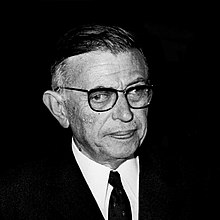Jean-Paul Sartre
Jean-Paul-Charles-Aymard Sartre (French: [saʁtʁ]; 21 Juin 1905 – 15 Apryle 1980) wis a French philosopher, playwricht, novelist, poleetical activist, biographer, an leeterar creetic. He wis ane o the key feegurs in the philosophy o exeestentialism an phenomenology, an ane o the leadin feegurs in 20t-century French philosophy and Marxism. His wark haes influenced sociology, creetical theory, post-colonial theory, an leeterar studies as weel, an conteenas tae influence thir disciplines.
Jean-Paul Sartre | |
|---|---|
 Sartre in 1967 | |
| Born | Jean-Paul-Charles-Aymard Sartre 21 Juin 1905 Paris, Fraunce |
| Dee'd | 15 Apryle 1980 (aged 74) Paris, Fraunce |
| Alma mater | École Normale Supérieure (BA/MA) |
| Era | 20t-century philosophy |
| Region | Westren philosophy |
| Schuil | Continental philosophy, Existentialism, Phenomenology, Existential phenomenology,[1] Hermeneutics,[1] Westren Marxism (early), Anarchism (late) |
Main interests | Metapheesics, epistemology, ethics, consciousness, sel-consciousness, leeteratur, poleetical philosophy, ontology |
Notable ideas | Bad faith, "existence precedes essence," nothingness, "Hell is ither fowk," situation, "every poseetional consciousness o an object is a non-poseetional consciousness o itsel,"[2][3] Sartrean terminology |
Influenced
| |
| Signatur |  |
Sartre wis notit for his appen relationship wi prominent feminist an fellae exeestentialist philosopher an writer Simone de Beauvoir. Thegither, Sartre an de Beauvoir challenged the cultural an social assumptions an expectations o thair upbringins, that they conseedert bourgeois, in baith lifestyle an thocht. The conflict atween oppressive, speeritually destructive conformity (mauvaise foi, leeterally, "bad faith") an an "authentic" wey o "bein" becam the dominant theme o Sartre's early wark, a theme embodied in his principal philosophical wark Bein an Naethingness (L'Être et le Néant, 1943).[6] Sartre's introduction tae his philosophy is his wark Existentialism Is a Humanism (L'existentialisme est un humanisme, 1946), oreeginally presentit as a lectur.
He wis awairdit the 1964 Nobel Prize in Leeteratur despite attemptin tae refuise it, sayin that he ayeweys declined offeecial honours an that "a writer shoud nae allou himsel tae be turned intae an institution".[7]
References
eedit- ↑ a b "Jean-Paul Sartre". Stanford Encyclopedia of Philosophy. Retrieved 27 October 2011.
- ↑ Sartre, J.-P. 2004 [1937]. The Transcendence of the Ego. Trans. Andrew Brown. Routledge, p. 7.
- ↑ Siewert, Charles, "Consciousness and Intentionality", The Stanford Encyclopedia of Philosophy (Fall 2011 Edition), Edward N. Zalta (ed.).
- ↑ Ian H. Birchall, Sartre against Stalinism, Berghahn Books, 2004, p. 176: "Sartre praised highly [Lefebvre's] work on sociological methodology, saying of it: 'It remains regrettable that Lefebvre has not found imitators among other Marxist intellectuals'."
- ↑ "Sartre's Debt to Rousseau" (PDF). Retrieved 2 Mairch 2010.
- ↑ McCloskey, Deirdre N. (2006). The Bourgeois Virtues: Ethics for an Age of Commerce. University of Chicago Press. p. 297. ISBN 0-226-55663-8.
- ↑ "Minnen, bara minnen" (ISBN 9100571407) from year 2000 by Lars Gyllensten. Address by Anders Österling, Member of the Swedish Academy. Retrieved on: 4 February 2012.